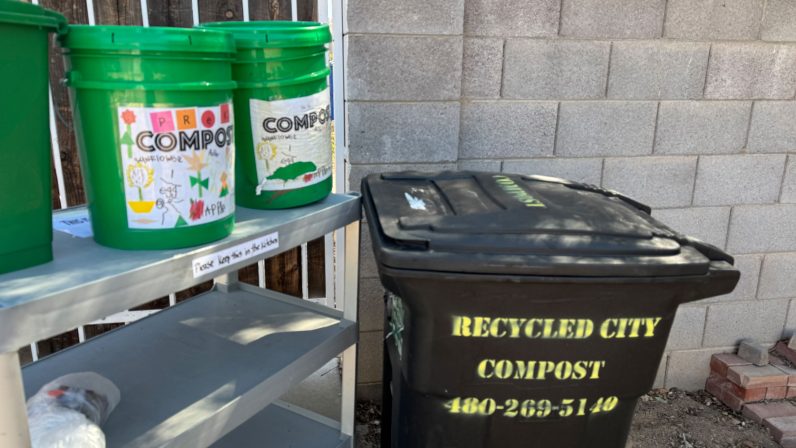I’ve been a composter at least 25 years. In our garden at home, we’ve tried numerous approaches to composting, including a large tumbler with a handle that stirred up what was inside. In the end, we have had the most success with a hole in one of our garden beds where we dump any organic matter, then cover it with soil. Over the years, the hole has migrated to a new spot from time to time.
One of the benefits of this approach is that sometimes a volunteer plant will sprout from the hole, providing mystery produce. This summer a beautiful green vine sprung up, and for weeks I was perplexed about what it might be. A few days ago, I discovered three lovely round cantalopes tucked away under the leaves.
At school we’ve talked about compost for years, attempting to bring all classes onboard with the process as part of our Seed gardening program. One year we bought small metal containers to fill with compost from each class. Gradually, though, less and less composting happened. For years we had two large outdoor compost areas on the south side of the building that produced an array of surprising foods. The most impressive one was when over 700 cherry tomatoes loaded up the trellises hovering over the Early 3s compost bed.
Since then, some classes have in-the-ground compost receptacles embedded in their gardens. And a year ago, we signed up with Recycled City Compost. R.City’s mission is to collect food waste, compost it, and then use it in their own gardens and/or sell it to farmers. We pay a monthly fee to have them pick up our compost, which includes mostly food scraps and paper towels. Each class is asked to collect their compost in a green bucket, then place the bucket in the hallway on Wednesday and Friday afternoons. The buckets are emptied into the larger collection bin, then returned to the classrooms.
We don’t produce a huge amount of material for compost each week, but it’s enough to fill our big bin. Most importantly, it’s a practice that educates our teachers and students about a significant phase of the food chain that is often overlooked. At a time when our planet needs all the help it can get, composting is a win-win. It reduces food waste and paper towels in land fills, it provides excellent nutrients to gardens and farms, and it reminds us all that even small acts can make a difference. As we continue through our school-wide food study, it’s a perfect time to include composting in the conversation. We hope, if you’re not already composting, you’ll consider trying it. And we’ll gladly accept your home compost in a plastic bag to add to our collection bin!

